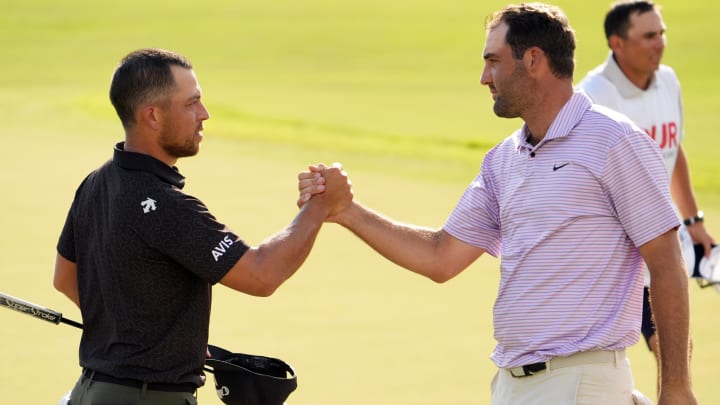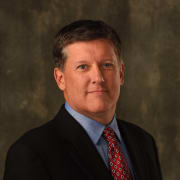The PGA Tour Still Can't Find the Best Way to End Its Season

ATLANTA—The barbs started flying quickly, relentless in their pointedness, predictable if not necessarily full of perspective. The PGA Tour was always setting itself up for derision due to its season-ending Tour Championship format.
It simply took six years for the humorists to become fully armed with the necessary fodder.
When Scottie Scheffler, the best player in the world and on the verge of a historic season, was given a scorecard advantage to begin the last tournament of the season, there were the understandable chuckles.
But when he shot an opening-round 65 at East Lake Golf Club – only one better than the next-best player in the field – to forge a seven-shot advantage in the “starting strokes’’ format used at the Tour Championship, the gloves came off and the proverbial haymakers were rampant.
Scheffler added a 66 on Friday during the second round and will take a four-shot lead over Collin Morikawa and a five-shot advantage over Xander Schauffele into the weekend of the season-ending event.
This was always the risk when in 2019 the PGA Tour put in place a plan to have just one winner at the Tour Championship.
Going back to its 2007 beginnings, there were years when the winner of the Tour Championship did not win the FedEx Cup. Among the more interesting came in 2009 when Phil Mickelson won the Tour Championship, Tiger Woods won the FedEx Cup and both were presented trophies by then-commissioner Tim Finchem—and Woods was seething that he didn’t win the tournament.
In many years, the player who won the Tour Championship also won the FedEx Cup, which made things nice and smooth for the Tour and benefactor FedEx.
But when Justin Thomas won the FedEx Cup in 2017, he complained that he came up short of winning the Tour Championship, which was won by Schauffele, then a rookie.
The $10 million bonus for winning the FedEx Cup didn’t seem to soothe Thomas, conditioned to winning the 72-hole event in which he was competing.
How to fix that? Don’t have a separate event.
The next year, the Tour announced a changed the format, but Tiger Woods won that 2018 tournament and Justin Rose captured the FedEx Cup.
Understandably, Woods’ victory—his first in five years and his 80th PGA Tour title—got a majority of the attention. Rose’s win, and the $10 million bonus, not so much. And that’s exactly what the Tour wanted to avoid. It was perfect example of why things needed to change.
(An aside, imagine the discourse had today's rules been in place back then; with everything playing out the same, Woods would not have gotten credit for a victory in 2018.)
Hence, today's format has tried to approximate a points reset with the leading points earner starting at 10 under, second place at 8 under and all the way down to even par for the last five players in the field.
Scheffler called the idea of it being a season-long race "silly" a few weeks ago when he noted that he could have been leading the entire way, had an injury this week, and dropped all the way to 30th.
Billy Horschel likened it to American sports' playoffs, like the 2007 New England Patriots, who lost to the wild-card New York Giants in the Super Bowl after not losing a game all year. Nobody flinched.
“If you want to just have a player that's playing the best at the end of the year, I think the playoffs will definitely identify that player,’’ Scheffler said of the three events that end the season—the FedEx St. Jude, the BMW Championship and the Tour Championship. “In terms of the season-long race, it's may not always be the guy that plays the best the whole season; it's going to be the guy that plays the best in these playoff events. That's really what you're identifying is the guy that plays the best in these last three events.
"In terms of when it first got started you had a year (2008) where I think it was Padraig Harrington won two majors and maybe didn't make the BMW, and I know he didn't make this tournament. So arguably it wasn't really a great setup then.
“And then you change the points to be a little lit less valuable in the Playoffs, but you still see a lot of volatility. You look at a guy like Keegan Bradley who shows last week and has a great week and wins the tournament, and now all of a sudden he goes from not being in East Lake to having a really, really great chance to win the FedEx Cup.
“So I think it provides a little bit of volatility, which is good for the fans, and I think it's also good for some players that are at -- didn't have their best years leading up to get into the Playoffs, and all of a sudden turn a year that's not their best into somewhat of a career year in terms of winning the FedEx Cup.”
That has always been the dilemma for the PGA Tour. It’s not really playoffs, because if it were, you’d have a system where someone like Scheffler, in theory, could be eliminated the first week. That can’t happen.
And yet his year-long dominance is not rewarded nearly to the level it deserves, either. The idea that he could tumble halfway down the leaderboard with one or two bad rounds goes against the ideology of a season-long race.
So the Tour came up with this awkward staggered strokes format that makes it easy to follow. And ridicule.
Until this year, it really wasn’t a problem. Starting in 2019, the only points leaders heading into East Lake who won the FedEx Cup, and thus the Tour Championship, were Dustin Johnson in 2020 and Patrick Cantlay in 2021.
Rory McIlroy won it in 2019 and 2022, coming from behind. Same for Viktor Hovland last year. That meant there was at least some drama in the final round. Even two years ago, Scheffler’s six-shot lead over McIlroy evaporated, creating a compelling final day.
If Scheffler steamrolls the field this weekend—still a possibility—there will inevitably be calls for change. Many of the ideas have already been vetted.
Play the Tour Championship as a regular tournament and then take the top four, six, eight players in a one-round event for the FedEx Cup...whittle a stroke-play field down to four or eight players in match play...go back to the old system...add up all the strokes in all three playoff events and have the lowest score count as the FedEx Cup champion.
One simple way might be to take some of the $100 million in bonus money this week and spread it around a bit. Put more of that into the regular season bonus pool that pays 10 players in the Comcast Business race. (Scheffler got an $8 million bonus for winning that). Make the purse for the FedEx St. Jude $25 million (up from $20 million) and the purse at the BMW $30 million (up from $20 million) to reward those who make it there.
Then let the 30 who advance to East Lake simply play for the tournament title, starting at even, with a $50 million purse. Under a typical purse structure, the winner would receive $9 million and 30th place would also get somewhere in the neighborhood of $1 million. A player like Scheffler, even if he has a bad week at East Lake, would have been richly rewarded along the way.
That is more like a true playoff system and eliminates the need for a hokey format that the Official World Golf Ranking won’t even recognize. (The OWGR awards points this week based on the actual 72-hole finish of each player, not how they finish in the FedEx Cup.)
There would undoubtedly be aspects to that plan worthy of ridicule, too. But that’s just par for the course as the PGA Tour attempts to end its season.
